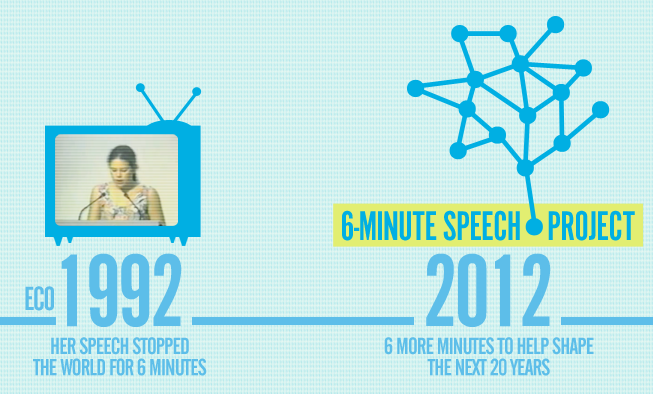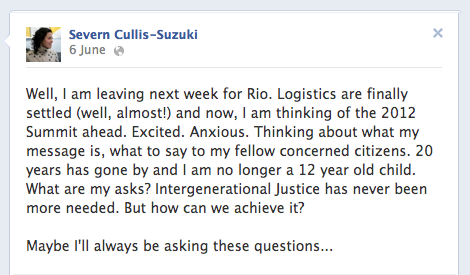SUMMARY
This is AI generated summarization, which may have errors. For context, always refer to the full article.

MANILA, Philippines – 20 years ago, a 12-year-old Canadian girl named Severn Suzuki raised money and flew to Rio de Janeiro, Brazil to address a crucial environmental gathering dubbed the Earth Summit. Her speech, which expressed deep concern about environmental destruction from the point of view of a child, stunned the delegates, including world leaders.
“Losing my future is not like losing an election or a few points on the stock market. I am here to speak for all generations to come…I am here to speak for the countless animals dying across this planet…We cannot afford to be not heard,” Severn lamented.
Though delivered before the use of the Internet expanded, Severn’s moving speech became a hit when it was uploaded on Youtube, earning her the monicker, “The Girl Who Silenced the World for 6 Minutes.”
Rio+20
The moving remarks inspired the 6-minute Speech Project launched by the United Nations for its Conference on Sustainable Development to be held in Rio de Janeiro, Brazil on June 20-22.
The project seeks to weave the speech from tweets, Facebook posts, videos and photographs that express the greatest challenges the world is facing today.
The final speech will be delivered through the power of digital media at the conference that will tackle green economy and poverty eradication.
Dubbed Rio+20, the international event will also mark the 20th anniversary of the summit which Severn addressed two decades ago.
Now a mother and environmental activist, Severn is flying back to Brazil to attend the biggest UN event yet.
This time, it is the future of her child and future grandchildren that Severn is fighting for.

Unsustainable path
Severn’s speech continued to haunt her child’s generation, mirroring the same fears and aspirations that will be taken up at the crucial UN environmental gathering.
Coinciding with the run-up to Rio+20, the United Nations Environment Programme (UNEP) recently released a report on the state of the world’s environment. The document highlights the condition, trends and trajectories of the planet, capturing the environmental concerns that Severn raised 20 years ago.
The wide-ranging assessment coordinated by UNEP stresses that the planet “continues to speed down an unsustainable path despite over 500 internationally agreed goals and objectives to support the sustainable management of the environment and improve human wellbeing.”
The alarming report seems to suggest that humans have already crossed or are bound to breach tipping points, planetary boundaries, which a leading group of environmental scientists proposed in 2009.
“You cross that and irreversible, catastrophic bad stuff happens,” said one of the environmental scientists, Jonathan Foley, an ecologist at the University of Minnesota.
Species extinction
“In my life, I have dreamt of seeing the great herds of wild animals, jungles and rainforests full of birds and butterfilies, but now I wonder if they will even exist for my children to see,” Severn told the Earth Summit delegates in 1992.
According to environmental scientists, species extinction should not cross the threshold of 10 species per million per year. The limit has clearly been breached based on the UNEP report.
UNEP revealed that vertebrate populations have decreased by nearly 30% since 1970. Meanwhile, about two-thirds of many groups of living organisms are now increasingly being threatened with extinction.
“The pressure on biodiversity continues to increase. Habitat loss and degradation from agriculture and infrastructure development, overexploitation, pollution and invasive alien species remain the predominant threats,” UNEP said.
![Air Pollution: A Major Cause of Premature Deaths [Source: UNEP, 2012] Source: UNEP, 2012](http://go.rappler.com/images/air%20pollution%20a%20major%20cause%20(1).jpg)
Air pollution
“I am afraid to breathe the air because I don’t know what chemicals are in it,” Severn expressed her fear as a child.
The UNEP report identified air pollution as one of the main causes of premature deaths and health problems primarily among children. Among the major air pollutants tackled in the report that impact on both human health and the environment were sulfur, nitrogen, small particulate matter and surface ozone — all products of human activities, trade in particular.
Environmental scientists have specifically proposed that humans shouldn’t contribute more than 25% of the nitrogen that is transferred from the atmosphere to the ground.
But according to UNEP, “human activity linked to energy use and food production has more than doubled the amount of reactive nitrogen circulating in the environment over the past century.”
Ozone depletion
“I am afraid to go out in the sun now because of the holes in the ozone,” Severn said in her speech, referring to the depletion of the vital layer of the earth’s atmosphere that absorbs biologically harmful ultraviolet (UV) radiation from the sun.
The ozone layer is recovering according to UNEP, noting that the expansion of the ‘Antarctic ozone hole’ has been stopped. But it is expected to revert to 1980 levels only between 2025 until the mid-century.
The report also sounded the alarm about the increasing use of hydroflurocarbons (HFCs), chemicals which replaced ozone-depleting ones but which emit greenhouse gases that cause global warming.
In a 2011 report, UNEP projected that by 2050, HFCs could cause emissions ranging from 3.5 to 8.8 gigatons (Gt) of carbon dioxide (Gt CO2eq). This is comparable to current annual emissions from transportation, a major source of greenhouse emission.
![Temperature change over the 20th century [Source: UNEP, 2012] Source: UNEP, 2012](http://go.rappler.com/images/temperature%20change%20over%20the%2020th%20century.jpg)
Global warming
UNEP declared that the global atmosphere is at a critical stage, saying that climate change is the most crucial atmospheric issue.
Greenhouse gas emissions are expected to double over the next 50 years, causing global temperatures to rise to 3°C or more by the end of the century, the new UNEP projected.
The report also noted that 4 independent studies confirmed that 2000-2009 was the warmest decade ever recorded and that atmospheric concentrations of CO2 are on the rise. In 2010, the rate of emissions from fossil fuel burning and cement production was the highest ever recorded, the report added.
Many scientists, decision-makers and advocates insist that the limit for carbon dioxide concentration in the atmosphere should be 350 parts per million (ppm). However, the CO2 concentration has already reached 388.5 ppm.
“There is growing concern that inaction will lead to changes that are irreversible at human timescales – so-called tipping points. Increased release of carbon stored in permafrost (perennially frozen ground), as CO2 or methane, is an example of a type of change that could give rise to a cycle of further warming and further releases of greenhouse gases,” UNEP warned.
![Concentrations of greenhouse gases, 2005, 2009, and 2010 [Source: UNEP, 2012] Source: UNEP, 2012](http://go.rappler.com/images/concentrations%20of%20greenhouse%20gases.jpg)
![Trends in temperature change and atmospheric CO2 concentrations, 1850-2010 [Source: UNEP, 2012] Source: UNEP, 2012](http://go.rappler.com/images/trends%20in%20temperature.jpg)
The future we want
“The report underlines the reasons why world leaders need to show decisive leadership in Rio and beyond,” UNEP said.
With the battlecry, “The future we want,” the Rio+20 conference once again gathers world leaders and thousands of participants from governments, the business sector and civil society to charter a sustainable future for the world’s 7 billion population, which is expected to reach 10 billion by 2100.
“I’m only a child yet I know we are all part of a family, 5 billion strong, in fact, 30-million-species strong and we all share the same air, water and soil — borders and governments will never change that. I’m only a child yet I know we are all in this together and should act as one single world towards one single goal,” Severn said, stunning the world during the 1992 Earth Summit.
The challenge for the 2012 environmental summit is to act and shape the future of the world. – Rappler.com
Click on the links below for related stories:
- Building the future we need
- Rio+20 adopts sustainable development blueprint
- [Thought Leaders] Another future is possible by Dean Tony La Viña
Add a comment
How does this make you feel?
There are no comments yet. Add your comment to start the conversation.